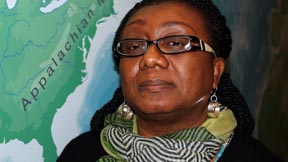 MINNEAPOLIS: As a nurse, Doris Parker says she is used to being exposed to AIDS, tuberculosis and other infectious diseases, so she’s not afraid to return to Liberia to help her native country fight a deadly Ebola outbreak.
MINNEAPOLIS: As a nurse, Doris Parker says she is used to being exposed to AIDS, tuberculosis and other infectious diseases, so she’s not afraid to return to Liberia to help her native country fight a deadly Ebola outbreak.
“I have a strong conviction this is what I need to do,” said Parker, a Minnesota medical surgical nurse who left with a group of medical responders bound for the West African nation. “As a nurse, we’re trained to help, to take care of the sick.”
After living in the U.S. for 28 years, Parker, a resident of a Minneapolis suburb, is making her first trip home to Liberia, where she was born, grew up and attended high school and still has relatives. She is motivated to treat her fellow Liberians and to help stop the virus from spreading. Ebola has killed more than 5,000 people in West Africa, mostly in Liberia, Guinea and Sierra Leone.
“If it’s not contained at the source, there’s a strong possibility it could be a major, global crisis,” Parker said while sitting in the offices of the Minneapolis-based nonprofit American Refugee Committee, which is organizing the mission.
The initial group of 11 being deployed includes four Liberian-Americans, said Daniel Wordsworth, the humanitarian organization’s president and CEO.
Another 25 people from across the U.S. might be deployed over the next six months, he said.
The initial goal is to establish an Ebola treatment center or “mini-hospital” in a remote area of far eastern Liberia, near the border with the Ivory Coast, Wordsworth said. By locating the center in the rural community of Fish Town, Wordsworth said, they hope to prevent the disease from spreading eastward into the Ivory Coast. The ultimate goal is to set up a treatment center in every county, or state, in Liberia, which will help get people infected with Ebola away from families and communities and into a quarantined space, he said.
“If we can do that, we can contain the disease and stop it from spreading,” Wordsworth told The Associated Press in a telephone interview.
Group members will attend specialized Ebola training and learn rigorous safety procedures. Then, they’ll serve a three-month rotation where they will be caring for patients and helping prevent the spread of the virus.
Parker already has completed training by the U.S. Centers for Disease Control and Prevention in Anniston, Alabama, and will undergo more training when she arrives in Liberia. When she returns to the U.S., she will be quarantined at home for 21 days, the incubation period for Ebola.
As part of the tight-knit community of Liberians living in the Twin Cities, Parker said she knew Patrick Sawyer of Coon Rapids, the first American to die of Ebola. Sawyer died on July 25 in Nigeria, days after he traveled from his native Liberia. He left behind a wife and three young daughters in Minnesota.
“We all are interconnected in the community,” Parker said. “It was just too close to home, very close to home when that happened.”
Wordsworth said his organization wants to bring “a depth of cultural competence and an understanding of the country and the society” to treating Ebola in Liberia.
“The fact that you can have a Liberian face treating you” in a hospital might comfort patients, he said. “It’s already an alien environment and the more you can see what’s common to you and real to you, the better. You’re frightened enough already.” -AP






